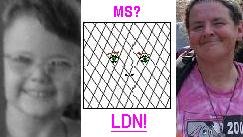Chapter ONE: Regarding MULTI-TASKING
Background: I was working in a busy family physician's office for years before I developed MS, and had already noticed some relatively mild cognitive problems before I was diagnosed, and I'd attributed the difficulties to chronic, severe sleep deprivation secondary to spinal pain, as well as ageing (I was 53).
In terms of my work itself, since I was salaried it didn't really matter to anyone if it took me longer (and longer) to get it all done, and I loved my job; I was the medical coder, in charge of medical records, prescription refill requests, writing most of letters for the doc, often answering the phone, explaining things to staff members & patients, etc. I was also responsible for keeping the doc as well-informed as possible by researching, screening & printing relevant daily medical news, and I still do that for her asof October, 2007. 
What ultimately made it impossible for me to stay in my job was my increasing inability to "multi-task"; I used to have about 12 things in the air at once, juggling them almost flawlessly, but with MS I found I just couldn't manage it the same way anymore. I don't know if my IQ went down, but I think it got narrower, if you can imagine that...
It's weird; I used to thrive on all that frantic activity & responsibility, but after MS changed my ability to multitask, I had to "retire" early.
While I was (and am still) able to complete any one task well (as long as there are no interruptions), multi-tasking used to be my strong point, and now it's history. And, unfortunately, in my former job, multi-tasking was essential, and it's harder when you get interrupted dozens of times every single day as I did; each interruption usually necessitated my starting over (and over and over!) at whatever I was working on when I got interrupted, which was of course very frustrating and time-consuming; I even tried working at night and on weekends when the office is quiet, but for various reasons that didn't work either. (Plus the office was WAY too warm for me, ice packs and all...)
Anyway, I've learned a few things in the last 4 years since diagnosis, like
1. Whenever possible, I avoid multi-tasking in the first place, because I know it's unlikely to work out. I try to arrange to do (or to focus on) one thing at a time, do it well, finish it and move on. It may seem less efficient, but for me, it's best.
2. I no longer try to just mentally shut out distractions while I'm struggling with a task that demands focus- I find it better to eliminate the distractions; basically that just means I turn off the (background) TV or music if it's distracting me and making things harder- when I'm trying to focus on something, silence is my new friend.
3. My cell phone is ever-present and always charged, and I've recently made friends with the alarm clock/reminder feature; I set reminder timers for myself all the time now, because when I get engrossed in something, I lose all track of time, and with the alarm set, I can relax. I found that just leaving myself little notes didn't help much, because I usually forgot to look at them. But I do keep a schedule on my computer and I refer to that every day unless I'm stuck in bed, which is rare and always due to spinal problems unrelated to MS. I don't try to hold too much in my head, because the effort is distracting, and distraction is best avoided.
4. Speaking of the cellphone, I've found that, since I got MS, talking on the phone is an annoyance; I can pay attention to people much more effectively when they're present. Actually, I haven't really been that comfortable yakking on the phone in the first place, but it's worse now. I think it's because I can't do anything else at the same time, and I get impatient, vaguely distracted by my urge to get the call over with, no matter who it is. And I never talk on the phone if I'm trying to do anything else (especially drive!)...it just doesn't work out. And I've flat out told most of my friends & family that talking on the phone is difficult, often even irritating for me, that it's nothing personal, but that I appreciate calls kept brief, prefer email or, better, seeing folks in person.
5. I keep my mind challenged in various ways by researching or studying things that interest me. Like one day for no particular reason I decided to memorize the Greek alphabet,  and to recite it every day until I could literally rattle it off backwards. It may seem silly, but I devise these little tests and tasks for myself so that I won't be the last to notice that I'm losing more of my marbles and that they're rolling under the refrigerator...I channel a lot of this BS into my blogs....
and to recite it every day until I could literally rattle it off backwards. It may seem silly, but I devise these little tests and tasks for myself so that I won't be the last to notice that I'm losing more of my marbles and that they're rolling under the refrigerator...I channel a lot of this BS into my blogs....




2 comments:
you are awesome! and i already love this blog altho ive only been on it for fifteen seconds...
my only comment, which is really more of a request and not a criticism-- BIGGER FONTS PLEASE???
thank you!!!
walking slower every day,
central MD
Flora- Fantastic LDN for MS resource you have here, and thanks for sharing your story!
SammyJo
Post a Comment